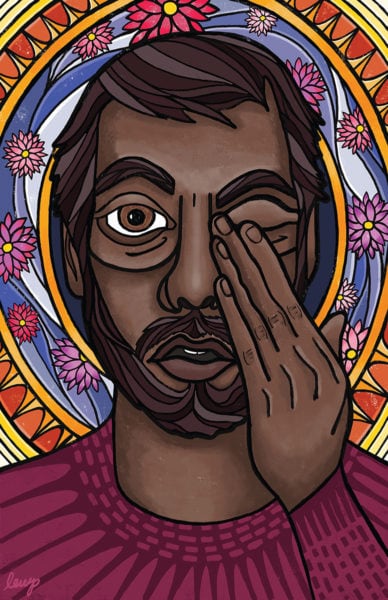
“Grieving Thomas” by Lauren Wright Pittman | A Sanctified Art LLC | sanctifiedart.org
Weekly Bible Devotional
“Unraveled: When the Unimaginable Has Happened ”
September 13, 2020
When the pandemic began, most of us felt that this was not really true or that such a thing could never really happen in our time. With all the scientific advances we have made, we did not imagine such a pandemic to be possible. It was simply unimaginable. In a way that is what happened to the disciples when they lost Jesus. The unimaginable had happened to them. The leader of their movement, the one they loved and followed, was executed. Even though Jesus had warned them that this was going to happen to him once he confronted the religious and political leaders in Jerusalem, they could not imagine that possibility. Jesus tried to prepare them for this possibility and for continuing his mission after he was gone from their midst, but they could not let themselves go there.
And so when life unraveled around them, the disciples struggled to move forward. They needed to be reminded of their eternal connection to Jesus before they could find their way through. Each of them had to go back to that experience of awe they had with Jesus. The one who got left out, Thomas, also needed that. The first time the disciples experienced a vision of Jesus, Thomas was not there and so he had a hard time accepting the witness of his friends.
I pray that the reflections from “A Sanctified Art” for this week will nudge you to move closer to the one who helps us imagine a new when the old ways unravel.
Scripture for This Week: John 20:19-29
19 When it was evening on that day, the first day of the week, and the doors of the house where the disciples had met were locked for fear of the Jews, Jesus came and stood among them and said, “Peace be with you.” 20 After he said this, he showed them his hands and his side. Then the disciples rejoiced when they saw the Lord. 21 Jesus said to them again, “Peace be with you. As the Father has sent me, so I send you.” 22 When he had said this, he breathed on them and said to them, “Receive the Holy Spirit. 23 If you forgive the sins of any, they are forgiven them; if you retain the sins of any, they are retained.”
24 But Thomas (who was called the Twin), one of the twelve, was not with them when Jesus came. 25 So the other disciples told him, “We have seen the Lord.” But he said to them, “Unless I see the mark of the nails in his hands, and put my finger in the mark of the nails and my hand in his side, I will not believe.”
26 A week later his disciples were again in the house, and Thomas was with them. Although the doors were shut, Jesus came and stood among them and said, “Peace be with you.” 27 Then he said to Thomas, “Put your finger here and see my hands. Reach out your hand and put it in my side. Do not doubt but believe.” 28 Thomas answered him, “My Lord and my God!” 29 Jesus said to him, “Have you believed because you have seen me? Blessed are those who have not seen and yet have come to believe.”
Theme Connections:
Sometimes unraveling leads us to our deepest pain. Jesus dies, leaving Thomas and the rest of the disciples alone. Thomas isolates himself from the disciples, perhaps plunged deep into despair and grief. After all of his worst fears have finally come true, Thomas is too blinded by hopelessness to believe in Jesus’ return. Yet, his despair unravels when he touches Jesus’ wounds and can finally see, and believe in, God’s presence after death.
What Has Unraveled and/or Is Unraveling?
• When the resurrected Christ appears before the disciples, their fear unravels into pure joy.
• Thomas’ grief after Jesus’ death unravels into despair and skepticism.
• When Christ appears to Thomas, his despair unravels into awe and revelation (v. 28).
Guiding Questions:
• Why is Thomas isolated from the other disciples when Jesus appears? Where is he? What is he doing and why?
• In verses 21 and 26, the Greek word for “peace” is eirene, stemming from the verb, eiro, which means to join or bind together that which has been separated. How does this definition for peace impact your reading of this story? What is being bound together?
• God creates the cosmos in six days, rests on the seventh, and then, on the eighth day, creation unfurls. Jesus rises from the dead the day after the Sabbath, the eighth day. According to Mosaic law, circumcisions were to be performed on the eighth day (Lev. 12:3). The eighth day symbolizes renewal, commissioning, a new creation. What is the significance for Thomas that Jesus appears to him eight days after the resurrection?
Quote for Inspiration:
“It seems you found the way, Thomas, but really, you knew it all along. You knew the way was not a roadmap. You knew the way was not a claim meant to exclude others. You knew the way was not that which you could use to reject others. Instead you knew the way was being in the presence of your Lord and God—and that’s all you wanted. You wanted what Jesus said you know. You asked for what Jesus said you should. You needed what Jesus said is yours—always. And in that moment you saw Jesus as your Lord and as your God. Wow. Thank you, Thomas, for your courage to ask.” —Karoline Lewis. “The Courage to Ask.” Published on Working Preacher. April 5, 2015. http://www.workingpreacher.org/craft.aspx?post=3580.
From the artist // Lauren Wright Pittman
When the unimaginable happens, we can find ourselves drowning in doubt. We flail, reaching for something to bolster our faith in a sovereign, living God. Here we see Thomas needing tangibility: “Unless I see the mark of the nails in his hands, put my finger in the mark of the nails and my hand in his side, I will not believe.” Thomas has just experienced the death of his teacher, close companion, and the long-awaited Messiah. Reeling in grief, Thomas needs a buoy to keep him afloat. Jesus offers Thomas peace, meeting him where he is instead of offering condemnation or a condescending nickname. He welcomes Thomas to do what he needs to find footing, but we aren’t told that Thomas actually acts upon the invitation. Instead, he says, “My Lord and my God!” Thomas is separated from Christ in death and all he asks is to be close to him again. Instead of poking Christ’s wounds in doubt, he reclaims relationship with Jesus.
When I visited India, I learned of “St. Thomas Christians.” It is said that during Thomas’ extensive travels he began several churches in southern India. To this day people proudly identify with his name. These Indian Christians do not define Thomas by his doubt; they define their own faith by his ministry. They know Christ because of Thomas. Thomas moved forward from that place of doubt, and his impact stretched to the far southern tip of India.
I chose to depict Thomas rubbing his eyes as he awakens from his grief to the reality that Christ has not left him. Lotus flowers (a symbol for India) swirl around his head in the waters that image the depth of his mourning. His ministry blooms out of this raw, authentic moment of appropriate doubt.
Look:
Take a few moments to gaze upon the artwork. Breathe deeply in quiet meditation as you observe the visual qualities of what you see: color, line, texture, movement, shape, form.
Now take a deeper look. What parts of the image are your eyes most drawn to? What parts of the image did you overlook?
Now engage your imagination. What story do you imagine for the figure?
Reflect:
– What has unraveled and/or is unraveling in this story?
– Why is Thomas isolated from the other disciples when Jesus appears? Where is he? What is he doing and why?
– In verses 21 and 26, the Greek word for “peace” is eirene, stemming from the verb, eiro, which means to join or bind together that which has been separated. How does this definition for peace impact your reading of this story? What is being bound together?
Write:
Thomas seeks tangibility to bolster his faith. Belief is shaped by lived experience. In the space below, reflect on a moment or memory when you have tangibly experienced God through sight, touch, or sound.
Pray:
When I am unraveled by brokenness, breathe your peace into my lungs so I might feel and know you are near. Amen.


